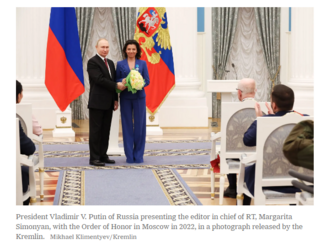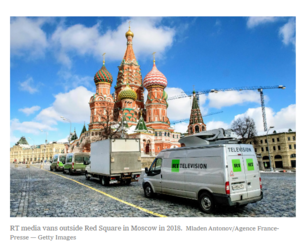How the Kremlin Finds Ways to Spread Its Messages
Social media companies may try to ban RT, the Russian state media broadcaster. But the network has proved in the past to be a wily adversary when confronted with efforts to silence it.

Major American social media companies sometimes describe the task of identifying disinformation or other malevolent material pushed online by state actors as an endless game of cat and mouse.
This week several of them made a significant play in that game by booting RT and its related Russian state-owned media network off their platforms, a move that in the short term will sharply reduce the network’s audience numbers, media analysts said. But the Kremlin, when thwarted in the past, has quickly devised new ways to get its message out, they noted, and RT can move to other outlets for distribution.
Take what happened just two years ago, when Canada and the European Union banned RT outright. Viewership in different countries for channels like RT Deutsch and RT France immediately cratered, but within days new pages appeared that exactly mirrored RT under different, unrelated names that were not blocked and popped up in internet search results, experts noted.
“This does not collapse their audience,” said Bret Schafer, a senior fellow at the German Marshall Fund, referring to the new ban. He co-wrote a report examining the continued spread of RT content after the earlier ban, which was prompted by Russia’s 2022 invasion of Ukraine. “If you are a really hardcore RT follower, you’ll find a way to access it,” he said. “What this really hurts is their ability to span platforms, to reach new audiences, to get in front of people who are not actively seeking out RT.”
During the past decade, the Kremlin moved to strangle all independent domestic media, driving much of it out of the country. But it also worked to create a state-run international broadcast network to end what President Vladimir V. Putin called a Western “monopoly” on information globally. RT is the central pillar of that network.
The online pages of RT and other, related outlets like Sputnik built a worldwide audience on Facebook of more than 88 million followers, according to data released on CrowdTangle early this year. RT’s basic message that the West remains an imperialist aggressor meshed well with widespread distrust of the United States and Europe.

The final live transmission from RT’s French network on March 2, 2022. Canada and the European Union banned RT and its related networks outright after the war in Ukraine began.Credit...Ludovic Marin/Agence France-Presse — Getty Images
On Monday, Meta, the parent company of Facebook, Instagram and WhatsApp, and Alphabet, which owns YouTube, banned RT and related organizations controlled by Rossiya Segodnya, an umbrella organization of Russian state media. The ban severed multiple arteries of the networks’ direct access to their audience.
There is no question, experts said, that the Russian networks will lose a significant chunk of their followers; those Facebook pages that attracted 88 million people have been taken down, for example.
“You cannot recreate one of these massive social media platforms overnight,” said Emerson T. Brooking, a resident fellow at the Digital Forensic Research Lab of the Atlantic Council.
But RT and the related networks have a lot of other options to spread their message, not least because they are extremely popular in Latin America, the Middle East and Africa. The use of mirrored pages means that they not only appear in search results, but their content can also be posted on places like Reddit or WhatsApp without necessarily setting off alarm bells.
In addition, there has been a proliferation of other platforms, including Telegram and X, which have not banned them.
In Latin America, for example, RT and related networks have a multi-tentacled distribution system that includes readily available television broadcasts as well as multiple social media platforms, according to Douglas Farah, the president of IBI Consultants and the lead author of a report examining RT’s influence in Latin America published by the United States Institute of Peace. RT itself has established a huge presence in Mexico, with its Latin American arm, Actualidad RT, plastering billboards around Mexico City early this year with slogans like “The Truth about the World is on RT.”
The teleSur television network, created by Venezuela, Cuba and various other states, broadcasts RT content directly across the continent, Mr. Farah said. A new online network, Canal Red, founded last year in Spain, also echoes content from RT and hired at least one prominent broadcaster who worked previously for the Russian network. It denies links to Russia, calling itself neutral.

President Vladimir V. Putin of Russia presenting the editor in chief of RT, Margarita Simonyan, with the Order of Honor in Moscow in 2022, in a photograph released by the Kremlin. Credit...Mikhael Klimentyev/Kremlin
Mr. Farah said that in recent months in Latin America, the Russian allied networks had become much more aggressive toward bashing Ukraine as a nest of Nazis. Overall, emphasizing the traditional reputation of the United States as an overbearing, exploitative power is a mainstay of the networks’ message, helping them find a sympathetic audience in the region, as they do in the Middle East.
“A big part of Russia’s PR strategy is to tap into criticism of America and more broadly speaking Western policy in different places, and right now they have the easiest time in the world in that regard because American policy when it comes to Israel and Gaza is incredibly unpopular worldwide,” said H.A. Hellyer, a nonresident scholar on Middle East politics at the Carnegie Endowment. “You get a lot more sympathetic coverage of the Palestinians on RT than on other English-language media.”
In Africa, RT secretly runs an online outlet, African Stream, across a wide range of platforms, according to the U.S. State Department. African Stream says it is an independent media outlet focused on African issues, and has put out a statement denying any link to RT. But the network has often pushed pro-Russian and anti-Western narratives, according to an analysis by the Internet Observatory at Stanford University.
When it comes to the United States, RT as a broadcast network has never attracted a wide audience, although experts said some online media organizations like Infowars have republished its articles.
Many Russian talking points, like the contention that American democracy is in disarray, will continue to spread in the United States anyway, said Sarah Ann Oates, an author of a new book, “Seeing Red: Russian Propaganda and American News,” largely because former President Donald J. Trump and his supporters say them.
“This is far more effective than this platform or that platform,” she said.

RT media vans outside Red Square in Moscow in 2018.Credit...Mladen Antonov/Agence France-Presse — Getty Images
Still, a series of U.S. criminal cases against RT announced this month might raise questions about the information it pushes that could drive away nonideological viewers, she and others said.
The social media giants had been under pressure to limit the spread of Russian propaganda since after the 2016 United States presidential election, when it became clear that the Kremlin had worked to sharpen domestic differences by, for example, using social media to organize competing street demonstrations.
Much of that work was carried out by the Internet Research Agency, a murky group run by the late catering magnate and mercenary leader, Yevgeny V. Prigozhin.
Now, the United States accuses the Kremlin of being deeply involved. Last week, Secretary of State Antony J. Blinken said RT and related media had direct links to Russian intelligence and have been working to spread disinformation to interfere in foreign elections and to help procure weapons for the Ukraine war.

Secretary of State Antony J. Blinken announcing that RT had been expanding its media operations to include cyber activities, in Washington, this month.Credit...Shawn Thew/EPA, via Shutterstock
A few days earlier, the news of the criminal cases against RT came out when the Justice Department indicted two RT employees for funneling at least $9.7 million to American podcasters at Tenet Media, a video-streaming site in Tennessee, to push Russian propaganda. In addition, the department shuttered 32 internet sites that it said Russia created to imitate the news pages of organizations like The Washington Post and Fox News, but used to spread Russian disinformation.
“Before it was smoke and mirrors, and now it is a smoking gun,” Ms. Oates said.
On Wednesday, the U.S. Senate Select Committee on Intelligence held a hearing focused on foreign threats to the current American election.
At the hearing, Senator Mark Warner, Democrat of Virginia and the head of the committee, questioned how much material Russia would get past the bans. “I think that they are getting through in many more ways than has been represented,” he said, noting that Russia, like the presidential candidates themselves, seemed to be focusing its efforts on the six main swing states.
Many Russian commentators lambasted the move by the social media companies as an attack on free speech, which U.S. officials characterized as laughable given the lack of any such freedom in Russia. “The idea that Russia or China would allow this kind of manipulation on their social media is beyond the pale,” Mr. Warner said during the hearing.
Ultimately, one strength of Russian media overseas has been its ability to constantly appear in new guises, experts said. “They have been very adaptive to different cultures,” Ms. Oates said. “RT is a lot like a hydra, you cut off one head and another one springs up.”
Milana Mazaeva contributed reporting.
Neil MacFarquhar has been a Times reporter since 1995, writing about a range of topics from war to politics to the arts, both internationally and in the United States. More about Neil MacFarquhar
A version of this article appears in print on , Section A, Page 10 of the New York edition with the headline: How Putin Manages to Spread His Message Despite West’s Whac-a-Mole. Order Reprints | Today’s Paper | Subscribe
(+)
Source : https://www.nytimes.com/2024/09/21/world/europe/russia-rt-social-media.htm
Social media companies may try to ban RT, the Russian state media broadcaster. But the network has proved in the past to be a wily adversary when confronted with efforts to silence it.

Major American social media companies sometimes describe the task of identifying disinformation or other malevolent material pushed online by state actors as an endless game of cat and mouse.
This week several of them made a significant play in that game by booting RT and its related Russian state-owned media network off their platforms, a move that in the short term will sharply reduce the network’s audience numbers, media analysts said. But the Kremlin, when thwarted in the past, has quickly devised new ways to get its message out, they noted, and RT can move to other outlets for distribution.
Take what happened just two years ago, when Canada and the European Union banned RT outright. Viewership in different countries for channels like RT Deutsch and RT France immediately cratered, but within days new pages appeared that exactly mirrored RT under different, unrelated names that were not blocked and popped up in internet search results, experts noted.
“This does not collapse their audience,” said Bret Schafer, a senior fellow at the German Marshall Fund, referring to the new ban. He co-wrote a report examining the continued spread of RT content after the earlier ban, which was prompted by Russia’s 2022 invasion of Ukraine. “If you are a really hardcore RT follower, you’ll find a way to access it,” he said. “What this really hurts is their ability to span platforms, to reach new audiences, to get in front of people who are not actively seeking out RT.”
During the past decade, the Kremlin moved to strangle all independent domestic media, driving much of it out of the country. But it also worked to create a state-run international broadcast network to end what President Vladimir V. Putin called a Western “monopoly” on information globally. RT is the central pillar of that network.
The online pages of RT and other, related outlets like Sputnik built a worldwide audience on Facebook of more than 88 million followers, according to data released on CrowdTangle early this year. RT’s basic message that the West remains an imperialist aggressor meshed well with widespread distrust of the United States and Europe.

The final live transmission from RT’s French network on March 2, 2022. Canada and the European Union banned RT and its related networks outright after the war in Ukraine began.Credit...Ludovic Marin/Agence France-Presse — Getty Images
On Monday, Meta, the parent company of Facebook, Instagram and WhatsApp, and Alphabet, which owns YouTube, banned RT and related organizations controlled by Rossiya Segodnya, an umbrella organization of Russian state media. The ban severed multiple arteries of the networks’ direct access to their audience.
There is no question, experts said, that the Russian networks will lose a significant chunk of their followers; those Facebook pages that attracted 88 million people have been taken down, for example.
“You cannot recreate one of these massive social media platforms overnight,” said Emerson T. Brooking, a resident fellow at the Digital Forensic Research Lab of the Atlantic Council.
But RT and the related networks have a lot of other options to spread their message, not least because they are extremely popular in Latin America, the Middle East and Africa. The use of mirrored pages means that they not only appear in search results, but their content can also be posted on places like Reddit or WhatsApp without necessarily setting off alarm bells.
In addition, there has been a proliferation of other platforms, including Telegram and X, which have not banned them.
In Latin America, for example, RT and related networks have a multi-tentacled distribution system that includes readily available television broadcasts as well as multiple social media platforms, according to Douglas Farah, the president of IBI Consultants and the lead author of a report examining RT’s influence in Latin America published by the United States Institute of Peace. RT itself has established a huge presence in Mexico, with its Latin American arm, Actualidad RT, plastering billboards around Mexico City early this year with slogans like “The Truth about the World is on RT.”
The teleSur television network, created by Venezuela, Cuba and various other states, broadcasts RT content directly across the continent, Mr. Farah said. A new online network, Canal Red, founded last year in Spain, also echoes content from RT and hired at least one prominent broadcaster who worked previously for the Russian network. It denies links to Russia, calling itself neutral.

President Vladimir V. Putin of Russia presenting the editor in chief of RT, Margarita Simonyan, with the Order of Honor in Moscow in 2022, in a photograph released by the Kremlin. Credit...Mikhael Klimentyev/Kremlin
Mr. Farah said that in recent months in Latin America, the Russian allied networks had become much more aggressive toward bashing Ukraine as a nest of Nazis. Overall, emphasizing the traditional reputation of the United States as an overbearing, exploitative power is a mainstay of the networks’ message, helping them find a sympathetic audience in the region, as they do in the Middle East.
“A big part of Russia’s PR strategy is to tap into criticism of America and more broadly speaking Western policy in different places, and right now they have the easiest time in the world in that regard because American policy when it comes to Israel and Gaza is incredibly unpopular worldwide,” said H.A. Hellyer, a nonresident scholar on Middle East politics at the Carnegie Endowment. “You get a lot more sympathetic coverage of the Palestinians on RT than on other English-language media.”
In Africa, RT secretly runs an online outlet, African Stream, across a wide range of platforms, according to the U.S. State Department. African Stream says it is an independent media outlet focused on African issues, and has put out a statement denying any link to RT. But the network has often pushed pro-Russian and anti-Western narratives, according to an analysis by the Internet Observatory at Stanford University.
When it comes to the United States, RT as a broadcast network has never attracted a wide audience, although experts said some online media organizations like Infowars have republished its articles.
Many Russian talking points, like the contention that American democracy is in disarray, will continue to spread in the United States anyway, said Sarah Ann Oates, an author of a new book, “Seeing Red: Russian Propaganda and American News,” largely because former President Donald J. Trump and his supporters say them.
“This is far more effective than this platform or that platform,” she said.

RT media vans outside Red Square in Moscow in 2018.Credit...Mladen Antonov/Agence France-Presse — Getty Images
Still, a series of U.S. criminal cases against RT announced this month might raise questions about the information it pushes that could drive away nonideological viewers, she and others said.
The social media giants had been under pressure to limit the spread of Russian propaganda since after the 2016 United States presidential election, when it became clear that the Kremlin had worked to sharpen domestic differences by, for example, using social media to organize competing street demonstrations.
Much of that work was carried out by the Internet Research Agency, a murky group run by the late catering magnate and mercenary leader, Yevgeny V. Prigozhin.
Now, the United States accuses the Kremlin of being deeply involved. Last week, Secretary of State Antony J. Blinken said RT and related media had direct links to Russian intelligence and have been working to spread disinformation to interfere in foreign elections and to help procure weapons for the Ukraine war.

Secretary of State Antony J. Blinken announcing that RT had been expanding its media operations to include cyber activities, in Washington, this month.Credit...Shawn Thew/EPA, via Shutterstock
A few days earlier, the news of the criminal cases against RT came out when the Justice Department indicted two RT employees for funneling at least $9.7 million to American podcasters at Tenet Media, a video-streaming site in Tennessee, to push Russian propaganda. In addition, the department shuttered 32 internet sites that it said Russia created to imitate the news pages of organizations like The Washington Post and Fox News, but used to spread Russian disinformation.
“Before it was smoke and mirrors, and now it is a smoking gun,” Ms. Oates said.
On Wednesday, the U.S. Senate Select Committee on Intelligence held a hearing focused on foreign threats to the current American election.
At the hearing, Senator Mark Warner, Democrat of Virginia and the head of the committee, questioned how much material Russia would get past the bans. “I think that they are getting through in many more ways than has been represented,” he said, noting that Russia, like the presidential candidates themselves, seemed to be focusing its efforts on the six main swing states.
Many Russian commentators lambasted the move by the social media companies as an attack on free speech, which U.S. officials characterized as laughable given the lack of any such freedom in Russia. “The idea that Russia or China would allow this kind of manipulation on their social media is beyond the pale,” Mr. Warner said during the hearing.
Ultimately, one strength of Russian media overseas has been its ability to constantly appear in new guises, experts said. “They have been very adaptive to different cultures,” Ms. Oates said. “RT is a lot like a hydra, you cut off one head and another one springs up.”
Milana Mazaeva contributed reporting.
Neil MacFarquhar has been a Times reporter since 1995, writing about a range of topics from war to politics to the arts, both internationally and in the United States. More about Neil MacFarquhar
A version of this article appears in print on , Section A, Page 10 of the New York edition with the headline: How Putin Manages to Spread His Message Despite West’s Whac-a-Mole. Order Reprints | Today’s Paper | Subscribe
(+)
Source : https://www.nytimes.com/2024/09/21/world/europe/russia-rt-social-media.htm